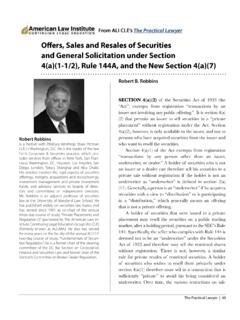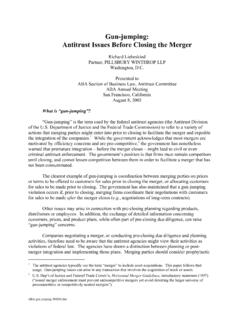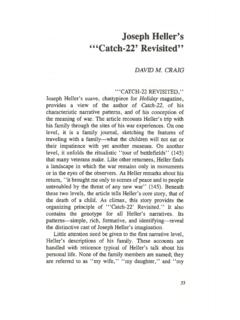Transcription of Corrective Action Catch 22: Court of Federal Claims …
1 Client Alert Government Contracts & Disputes Pillsbury Winthrop Shaw Pittman LLP | 1 August 19, 2014 Corrective Action Catch 22: Court of Federal Claims Holds Agency Action Must Be Rational Even If GAO Protest Decision Was Not. By C. Jo l Van Over and Alexander B. Ginsberg The United States Court of Federal Claims July 15, 2014 decision in RUSH Construction, Inc. v. United States, reflects the unusual circumstance in which the Court effectively sat in appellate review of an earlier bid protest decision by the Government Accountability Office (GAO) after the Army Corps of Engineers followed GAO s recommendation in that decision. The Court ultimately overruled GAO when it found that it was arbitrary and capricious for the agency to follow GAO s irrational recommendation.
2 In so doing, the Court cited numerous flaws in GAO s reasoning and its reliance on inapposite case law. The RUSH decision, authored by the Court of Federal Claims new chief judge, may foretell greater judicial scrutiny of agency Corrective Action and a shift at the Court away from deference to GAO s bid protest recommendations. Background Federal government contractors familiar with the bid protest process know that, in addition to challenging an agency s procurement decision at the agency itself, they have the options of protesting before both GAO and the Court of Federal Claims . GAO has long been the most common destination for protests, in part because contractors and their counsel know that they can get two bites at the apple that filing a protest at GAO does not preclude the contractor from filing later with the Court in the event of an adverse GAO A common misconception, however, is that GAO decisions may be appealed to the Court 1 Many protesters also prefer to file at GAO to avail themselves of the automatic stay provisions of the Competition in Contracting Act, 31 3553.
3 Which compel an agency to stay the award or performance of a contract in response to a Client Alert Government Contracts & Disputes Client Alert Government Contracts & Disputes Pillsbury Winthrop Shaw Pittman LLP | 2 of Federal Claims . On the contrary, the Court generally does not sit in appellate review of a GAO decision. Rather, the Court s inquiry in each protest brought before it whether or not that protest started at GAO is whether the agency in question acted rationally or whether the agency decision was arbitrary, capricious, an abuse of discretion or otherwise not in accordance with law. See Administrative Procedure Act, 5 706(2)(A) (2012).
4 2 The Court serves as the initial trier of fact and conducts a de novo review of the record. Thus, because the Court of Federal Claims is charged with evaluating the actions of the agency, rarely has the Court had cause or otherwise opted to critique GAO s preceding decision in a protest involving the same procurement where the agency followed a GAO recommendation. Indeed, where the Court has discussed such decisions, typically it has deferred to R USH in no way embodies this typical result. The RUSH Decision RUSH involved a post-award bid protest related to a procurement conducted by the Army Corps of Engineers (CoE) to repair a lock and barge canal in Florida.
5 The procurement was conducted under Federal Acquisition Regulation (FAR) Part 14 and involved the submission of sealed bids. Bidders were required to submit a two-page bid document containing (on page one) a bid schedule for the solicitation s base work and (on page two) a bid schedule for the solicitation s option work. The solicitation incorporated FAR , which stipulates that [b]idders shall acknowledge receipt of any amendment to this . At bid opening, the contracting officer (CO) discovered that Rush Construction s bid schedule s numbering sequence of line items did not match the numbering sequence of line items provided in the solicitation.
6 Specifically, the line item numbering on page two of RUSH s bid was wrong. In addition, although RUSH acknowledged the five amendments to the solicitation, page two of RUSH s bid referenced the portion of Amendment 5 that applied only to the solicitation s base work, not the portion that applied to the option work. As RUSH later explained to the Court , it had copied the bid schedule from page one of its bid , the schedule associated with the base work into the bid schedule on page two of its bid. While it did adjust the quantities listed in the schedule on page two, RUSH failed to make the changes that would have fixed the foregoing errors. The CO, however, decided to waive the errors as minor informalities in accordance with FAR , and the CoE awarded the contract to RUSH, as the low bidder.
7 An unsuccessful bidder protested at GAO, contending that the errors rendered RUSH s bid ambiguous and non-responsive. See C&D Const., Inc., , Feb. 14, 2014, 2014 CPD 69. GAO agreed, finding that RUSH s bid contained material deviations from the terms of the solicitation, which could not be waived. In reaching this conclusion, GAO s legal analysis was succinct in fact, it was largely confined to one paragraph, wherein GAO stated: timely filed GAO protest. By contrast, the Court of Federal Claims is not subject to these automatic stay provisions. Protesters at the Court must either obtain the agency s voluntary consent to stay performance or file a motion for a preliminary injunction to enjoin the agency s performance pending the Court s final decision on the protest.
8 2 Under the APA standard .. a bid award may be set aside if either (1) the procurement official s decision lacked a rational basis; or (2) the procurement procedure involved a violation of regulation or procedure. Banknote Corp. of Am., Inc. v. United States, 365 1345, 1351 (Fed. Cir. 2004) (citation omitted). 3 See, , Glenn Defense Marine (Asia) PTE Ltd. v. United States, 97 Fed. Cl. 568, 577 (2011) ( Given the diverse factual scenarios that appear before [GAO], its decisions traditionally have been accorded a high degree of deference by the courts, particularly those involving bid protests. While GAO decisions are not binding upon this Court , they may be considered as expert opinion, which [the Court ] should prudently consider.)
9 4 FAR provides, in relevant part: [a] minor informality or irregularity is one that is merely a matter of form and not of substance. It also pertains to some immaterial defect in a bid or variation of a bid from the exact requirements of the invitation that can be corrected or waived without being prejudicial to other bidders. The defect or variation is immaterial when the effect on price, quantity, quality, or delivery is negligible when contrasted with the total cost or scope of the supplies or services being acquired. The contracting officer either shall give the bidder an opportunity to cure any deficiency resulting from a minor informality or irregularity in a bid or waive the deficiency, whichever is to the advantage of the Government.
10 Client Alert Government Contracts & Disputes Pillsbury Winthrop Shaw Pittman LLP | 3 A bid that fails to include a price for every item required by the IFB generally must be rejected as nonresponsive. HH & K Builders, B 232140, Oct. 20, 1988, 88 2 CPD 379 at 2, recon. denied, B , Nov. 30, 1988, 88 2 CPD 537. This includes a bidder's failure to provide a responsive bid for optional contract line items, which thus renders the entire bid nonresponsive. Massillon Constr. & Supply, Inc., B 407931, Mar. 28, 2013, 2013 CPD 85 at 3. This rule reflects the legal principle that a bidder who has failed to submit a price for an item generally cannot be said to be obligated to furnish that item.


















